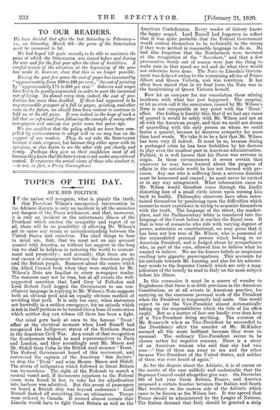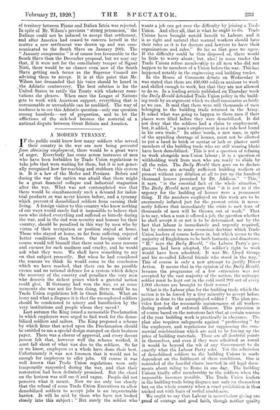TOPICS OF THE DAY.
SICK-BED POLITICS.
IF the nation will recognize, what is plainly the truth, that President Wilson's unexpected. intervention in the Adriatic dispute is only an incident in all the anxieties and dangers of the Peace settlement, and that, moreover, it is only an incident in the unfortunate illness of the President which excites the sympathy and regret of us all, there will be no possibility of allowing Mr. Wilson's .act to cause any strain or misunderstanding between the United States and ourselves. The chief things to bear in mind are, first, that we must not on any account quarrel with America, as without her support in the long run we shall be helpless in restoring the world to content- ment and prosperity ; and secondly, that there are no real causes of estrangement between the American people and the British people. Rumours about the course which the Allied Council took when they were startled by Mr. Wilson's Note are familiar to every newspaper reader. The rumours may not be true, but at all events the well- supported assertion that Lord Grey "of Fallodon and Lord Robert Cecil begged the Government to use con- ciliatory language in replying to Mr. Wilson's Note suggests both an obvious peril and an equally obvious method of avoiding that peril. It is only too easy, when statesmen act hurriedly in a sudden emergency, for an episode which is not in itself perilous to be turned into a bone of contention which neither dog can release till there has been a fight.
Our mind goes back at once to the famous ' Trent' affair at the electrical moment when Lord Russell had recognized the belligerent status of the Southern States in the American Civil War. As a result of that recognition the Southerners wished to send representatives to Paris and London, and they accordingly sent Mr. Mason and Mr. Slidell from Cuba in the British mail steamer ' Trent.' The Federal Government heard of this movement, and instructed the captain of the American ' San Jacinto ' to stop the ' Trent' and seize Messrs. Mason and Slidell. The storm of indignation which followed in Great Britain was tremendous. The right of the Federals to search a neutral vessel and, if documents injurious to the Federal cause were found in her, to take her for adjudication into harbour was admitted. But this arrest of passengers on board. a British ship was beyond endurance ! Lord Russell dashed off something like an ultimatum. Troops were ordered to Canada. It seemed almost certain that Lincoln would have to fight Great Britain as well as the American Confederates. Every reader of history knows the happy sequel. Lord Russell had forgotten to reflect that it was quite probable that the Federal Government would confess themselves to be technically in the wrong if they were invited in reasonable language to do so. He had also forgotten that the Northerners were incensed at the recognition of the " Seceshers," and that a few provocative words out of season were just the thing to make men in that mood see red and do what they would not otherwise have done. The Note to Lincoln's Govern- ment was delayed owing to the restraining advice of Prince Albert and Queen Victoria, and was rewritten. It has often been stated. that in its final form the Note was in the handwriting of Queen Victoria herself.
Now let us compare for our consolation these stirring incidents with what has just happened. The surprise, or let us even call it the annoyance, caused by Mr. Wilson's Note is not comparable at any point with the ' Trent ' affair. Our feeling is frankly this, that if we had any cause of quarrel it would be solely with Mr. Wilson and not at all with the American people, and that we could not dream of quarrelling with the only person on whom we could fasten a quarrel, because he deserves sympathy far more than hard words. We take it to be a fact that Mr. Wilson has been very ill indeed. It must be so, because during a prolonged crisis he has been forbidden by his doctors to play even the smallest part in American administration. Further, it is well known that his illness was nervous in origin. In these circumstances it seems certain that whatever he may have learned about the prowess of affairs in the outside world he has not learned with pre- cision. Any one who is suffering from a nervous disorder must be humoured and coaxed ; he must never be excited or in any way antagonized. What information came to Mr. Wilson would therefore come through the kindly distorting lens of a small circle intent upon nursing him back to health. Philosophic observers have often enter- tained themselves by pondering upon the difficulties which monarchs must experience in trying to acquaint themselves with the truth. The language of the street, the market. place, and the Parliamentary lobby is translated into the language of the Court before it reaches the Royal ears. II that is true of monarchs who rule with varying degrees of power, autocratic or constitutional, we may guess that it has been not less true of Mr. Wilson, who is possessed of the unparalleled personal powers which belong to an American President, and is hedged about by sympathizers who, as part of the cure, allowed him to believe what he wanted to believe. We see his former beliefs or suspicions swelling into gigantic preoccupations. This accounts for his attitude towards Mr. Lansing, and also for his admoni- tory words to the Supreme Council, which are only a mag- nification of the homily he read to Italy on the same subject before his illness.
In this connexion it must be a source of wonder to Englishmen that there is so little provision in the American Constitution, or at all events in American practice, for carrying on the enormous personal work of the President when the President is temporarily laid aside. One would expect to see the Vice-President almost automatically taking up the responsibilities which the title of his office imply. But as a matter of fact one hardly ever does hear of a Vice-President doing anything. The services of Mr. Roosevelt when as Vice-President he succeeded to the Presidency after the murder of Mr. McKinley seemed all the more brilliant because they were so unusual. The ordinary Vice-President seems to be chosen rather for negative reasons. There is a story of an American woman who said that she had two sons—" One of them ran away to sea and the other became Vice-President of the United States, and neither of them was ever heard of again."
As for the dispute about the Adriatic, it is of course on the merits of the case unlikely and undesirable that the Supreme Council could altogether give way. On December 9th of last year Great Britain, France, and America proposed a certain frontier between the Italian and South Slav territory on the eastern side of the Adriatic which came to be known as the Wilson line. It was agreed that Fiume should be administered by the League of Nations. The Italian demand that Italy should be granted a strip of territory between Fiume and Italian Istria was rejected. In spite of Mr. Wilson's previous "strong persuasion," the Italians could not be induced to accept that settlement, and after America had ceased to concern herself in the matter a new settlement was drawn up and was com- municated to the South Slays on January 20th. The " January compromise " is of course less favourable to the South Slays than the December proposal, but we may say that, if it were not for the conciliatory temper of Signor Nitti, there would be no chance even now of the South Slays getting such terms as the Supreme Council are advising them to accept. It is at this point that Mr. Wilson has demanded that his voice should be heard in the Adriatic controversy. The best solution is for the United States to ratify the Treaty with whatever reser- vations she pleases. When once the League of Nations gets to work with American support, everything that is unreasonable or unworkable can be modified. The way of madness is to see this Adriatic question—only one question among hundreds—out of proportion, and to let the afflictions of the sick-bed become the material of a national dispute between Great Britain and America.



































 Previous page
Previous page